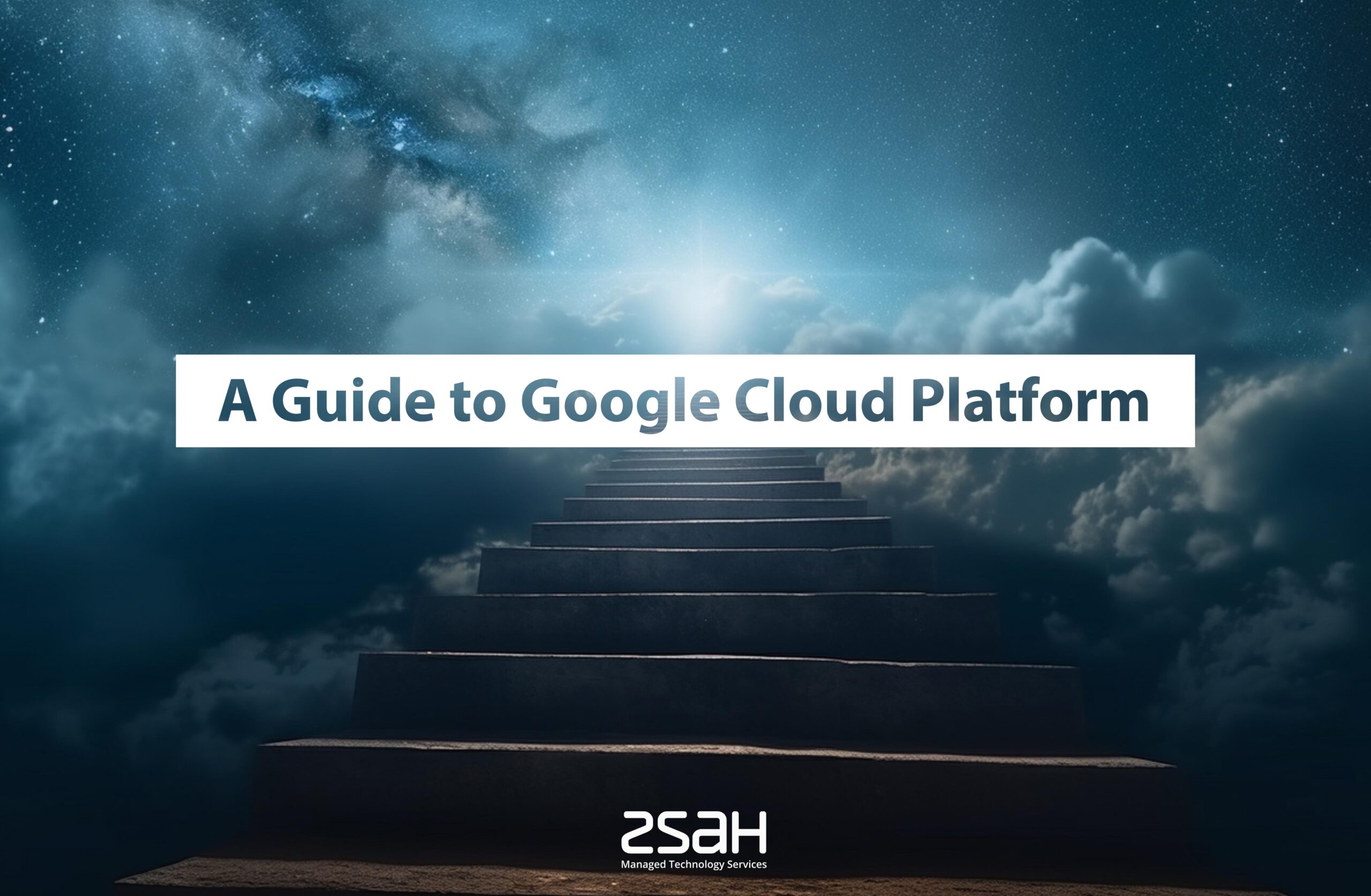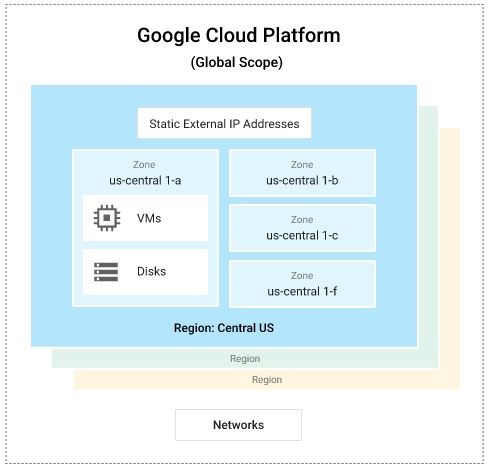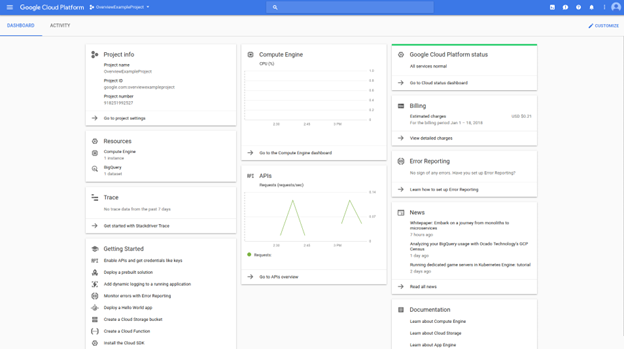A Guide to Google Cloud Platform (GCP)

What Is Google Cloud Platform (GCP)?
Google Cloud Platform, or GCP for short, is a suite of cloud services offered by Google, which enables users to build, deploy, and run applications on the web. To this end, GCP offers a range of options, including data storage, data processing, software development tools, and data analytics. The GCP suite includes software development kits (SDKs) for a variety of programming languages, and a range of networking services. In this way, Google Cloud Platform allows users to deploy applications on a variety of machines, including servers, containers, and virtual machines (VMs).
Google Cloud Platform is one of a suite of products that includes Google Drive, Google Maps, and Google Analytics. As part of the world’s largest cloud network, GCP draws on a vast, connected system of global and regional resources to offer cloud-based solutions such as Infrastructure as a Service (IaaS), compute, storage, database, web, cloud functions, and fully-managed services for small and large-scale enterprises alike.
GCP is also notable for its cost effectiveness. While, like its competitors, Google Cloud Platform operates on a pay-as-you-go (PAYG), GCP is often cheaper than Amazon Web Services (AWS) and Microsoft Azure – in fact, depending on the instance, it’s some 25-50% cheaper than AWS, as of March 2023. The reason for this is that GCP bills on minute-level increments, only charging for the computing time that is used. So, while Google Cloud Platform costs per month vary depending on the size of your account, on average, the price is $5-$10 per user per month. Service costs also decrease as the size of your account increases.
(Video source: youtube.com)
Google Cloud Platform Fundamentals
Google Cloud Platform consists of a set of infrastructure assets such as physical hardware and virtual resources, which are hosted in Google's data centres around the globe. Each data centre resides in a region, which Google maintains in Asia, Australia, Europe, North America, and South America. Each region consists of a collection of independent zones, which are identified by a name that combines a letter identifier with the name of the region. For example, Zone A in the East Asia region is designated as “asia-east1-a”.
[Image source: Google]
GCP offers global resources, which include preconfigured disk images, disk snapshots, and networks. There are also regional resources such as static external IP addresses that can be accessed only by resources located within the same region. Zonal resources like virtual machine instances can be accessed only by resources in the same zone.
Each Google Cloud resource that you allocate or use must belong to a project, which consists of settings, permissions, and other metadata describing your applications. Every GCP project requires a name (which you provide), a project ID (which you or Google Cloud can designate), and a project number (provided by Google).
You can interact with GCP services and resources via the Google Cloud Console – a web-based, graphical user interface (GUI) for managing your projects and resources.
[Image source: Google]
Alternatively, you can use the Command-Line Interface – Google Cloud CLI – to perform most tasks via a terminal window. Google Cloud CPI can open a terminal window on your computer that lets you run commands to manage Google Cloud resources.
There’s also the option to use a browser-based environment called Cloud Shell, which you can open from the Google Cloud console without having to install additional software.
[Image source: Google]
Google Cloud Platform (GCP) Components and Resources
Google Cloud Platform (GCP) consists of a number of components. They include the following.
Compute
The GCP compute component provides services and resources that enable computing power and the hosting of your cloud. Among them are the App Engine (a serverless application platform for apps and back ends), the Compute Engine (powered by Virtual Machines running in Google's data centre), Cloud Run, Cloud Functions, and Kubernetes Engine – a managed environment for running containerised apps.
Storage and Database
The GCP storage and database service enables users and their applications to store media files, backups, or other objects that have file-like attributes. This Google Cloud Platform component includes the services Cloud Storage, Cloud SQL (which provides relational database services for MySQL, PostgreSQL, and SQL Server), Cloud Bigtable (a NoSQL wide-column database for storing big data with low latency), Cloud Spanner (a relational database management system for database administration), and Cloud Datastore.
Networking
The GCP networking component provides a number of services, such as a range of Network Service Tiers, Cloud Load Balancing, Cloud DNS (a Domain Name System for low-latency name lookups), Cloud Armor (a tool for creating security policies and defences against web and DDoS attacks), Cloud CDN (a Content Delivery Network for serving web and video content), and Cloud Interconnect.
Big Data
The big data service of Google Cloud Platform (GCP) provides tools and functionality for processing and querying big data in the cloud. These include BigQuery (a data warehouse facility), Cloud Dataproc (a service for running Apache Spark and Apache Hadoop clusters), Cloud Datalab, Cloud Data Fusion (a data integration tool for building and managing data pipelines), and Cloud Data Studio.
Developer Tools
For software and application development, Google Cloud Platform (GCP) provides a number of tools. Among them are an Artifact Registry (a place to store, manage, and secure container images and language packages), Cloud SDK (Software Development Kit), Cloud Code (an IDE support service for writing, running, and debugging Kubernetes applications) CloudBuild (a solution for running build steps in a Docker container), Cloud Scheduler (a job scheduler for task automation and management), and Cloud Tasks.
Identity and Security Management
This component of GCP includes tools and services for application and system security and authentication. These include Security Key Enforcement, Cloud Identity (a unified platform for IT administrators to manage user devices and apps), Cloud IAM (an Identity and Access Management permissions system for Google Cloud resources), and a Cloud Data Loss Prevention API (Application Programming Interface).
Internet of Things (IoT)
Google Cloud Platform also provides a dedicated set of tools for creating and managing Internet of Things (IoT) environments, including Cloud IoT Core (a device management, integration, and connection service), Edge TPU (Tensor Processing Units for machine learning applications), and Cloud IoT.
Cloud AI
With Artificial Intelligence (AI) systems now a high-profile technology, GCP provides a number of services relating to AI and machine learning. They include Cloud Natural Language, Cloud Speech-to-Text, Cloud Text-to-Speech, a Cloud Translation API, Cloud Vision API, and Cloud Video Intelligence – as well as Cloud GPUs (Graphics Processing Units for machine learning, scientific computing, and 3D visualisation).
Management Tools
For management and monitoring, Google Cloud Platform offers the Cloud Console and Cloud Shell interfaces described earlier, together with a Cloud Deployment Manager and Cloud APIs.
API Platform
The GCP Application Programming Interface offering includes the services API Gateway (a fully managed gateway for developing, deploying, securing, and managing APIs), Maps Platform, Developer Portal, API Analytics, Apigee Sense (an API management, development, and security platform), and Cloud Endpoints (a deployment and development management tool for APIs on Google Cloud).
(Video source: youtube.com)
How Google Cloud Platform (GCP) Has Evolved to Serve Its Users
Since its debut in 2006, Google Cloud has been growing at a rapid pace. In 2017, the platform made $10.5 billion in revenue, rising to $11. 2 billion by the end of 2022.
As of 2021, Google Cloud Platform has been rolling out a succession of new services and tools to augment its existing offerings. These additions have the aim of breaking down data silos, enabling real-time data analysis, and broadening data access to more users within organisations. They include Dataplex, BigQuery ML, and BigQuery BI Engine. Google Cloud is currently developing 18 new capabilities for its big data analytics service BigQuery, plus an additional 11 capabilities for other Google Cloud tools.
Google Cloud Platform is also investing in undersea data cabling, aiming to maximise network bandwidth, speed up data flows, and make its cloud network more robust by enabling quicker redirection of traffic during outages.
The immense size and coverage of Google Cloud Platform’s global network helps ensure that users can gain access to GCP services, even in the most remote of areas. From a user perspective, this translates into quicker loading websites and improved performance for mobile and web applications. At maximum delivery, Google Cloud Platform can provide data transfer speeds of up to 10 Terabytes per second (10 Tbps). For commercial organisations, this level of performance can greatly reduce website bounce rates and increase conversions.
For web developers, GCP provides ease of use capabilities that enable administrators to reduce the complexity associated with choosing valid domain names, choosing a content management system, configuring servers, and defining which database to link to a particular web page. GCP solutions have predefined settings – and users can benefit from other Google Cloud resources such as managed SSL certificates that renew domains automatically.
With more than 500 employees in its security department, Google Cloud Platform is also positioned to offer users top level data protection. Google constantly releases security updates and re-educates its staff on cybersecurity matters. In the event of a breach, users are immediately informed and given managed access for tracking revisions and those responsible for making them, as well as inspecting logs of the activities taken by Google employees.
In terms of customer support, Google Cloud Platform offers three options to its consumers.
First, there are Standard, Enhanced, or Premium levels of paid support, which give subscribers access to expanded support for the entire range of Google Cloud computing services. For example, Premium support promises customers a 15-minute response 24/7/365. Users can adapt their level of support according to their needs for each product.
The Google Cloud Community provides a second support option, by providing free access to a huge community of active industry peers and knowledgeable users. Customers may also submit queries to Google Groups and participate in discussions concerning their support issues.
Finally, for those who prefer a do-it-yourself approach to technical support, the Google Cloud Support Knowledge Base provides documentation and tutorials on resolving issues. It also offers code samples, release notes, and other free resources.
Pricing Considerations for GCP Consumers
Google Cloud Platform has a reputation for providing greater value for money than its main competitors. GCP does this by billing per minute (even per second in some instances) for its services, rather than per hour.
To get a precise cost estimate for your particular use case you’ll need to delve into the GCP pricing web pages – though the video below gives a good overview.
(Video source: youtube.com)
Google Cloud Platform offers a free tier with limited resources under the Google Cloud Free Program. This option is particularly suitable for small businesses, non-profits, charities, and educational institutions.
Paid tiers offer greater resources and capabilities and are suitable for larger organisations and commercial enterprises. These paid tiers also provide additional benefits, such as 24/7 support and automated deployment.
Overall, this makes Google Cloud Platform (GCP) a viable and cost-effective option for businesses of all types and sizes in all sectors.
A few of Google Cloud Platform GCP Competitors include:
Each cloud provider has its strengths and specialities that can make it suitable for different businesses or purposes.
Sign Up Now!
For expert advice and resources – blogs, interviews, webinars, guides and more.




